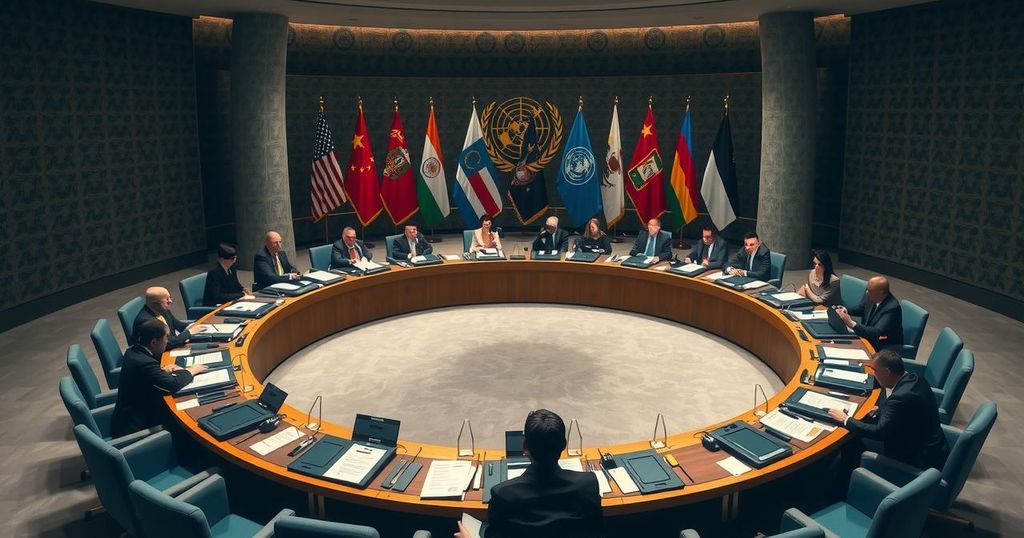Global news
AFRICA, ALGERIA, ASIA, CHINA, CIVIL WAR, CONFLICT RESOLUTION, EUROPE/ASIA, HUMANITARIAN CRISIS, INTERNATIONAL RELATIONS, JOHN KELLEY, KIIR, MACHAR, MEXICO, NEWSNATION, NORTH AMERICA, NUER, PAKISTAN, RIEK MACHAR, RUSSIA, SECURITY COUNCIL, SIERRA LEONE, SOMALIA, SOUTH SUDAN, SUDAN, U. N, U. N. SECURITY COUNCIL, U. S, UN, UNITED NATIONS
Jamal Walker
0 Comments
Divided UN Extends Arms Embargo on South Sudan Amid Rising Civil War Fears
The U.N. Security Council has extended the arms embargo on South Sudan amid fears of renewed civil war, following a vote that saw minimal support from the international community. The ongoing tensions between President Salva Kiir and Riek Machar have raised alarms about escalating violence. Moreover, the arms embargo continues to be a contentious issue, with various nations differing on its necessity and impact on peace efforts.
The United Nations Security Council recently made a pivotal decision, extending the arms embargo on South Sudan amidst rising fears of yet another civil conflict. The resolution, propelled by the United States, garnered the bare minimum of nine votes needed for approval, but it faced opposition as six countries, including Russia and China, chose to abstain. The arms embargo, coupled with existing travel and asset sanctions against certain South Sudanese officials, has now been prolonged for an additional year, until May 31, 2026.
South Sudan’s journey since gaining independence from Sudan in 2011 has been tumultuous. Initially seen as a hopeful new chapter, the nation quickly deteriorated into civil war in December 2013, triggered by a power struggle between President Salva Kiir and opposition leader Riek Machar. Although a peace agreement in 2018 brought Machar back into a governmental role as first vice-president, the situation remains fragile, with a forthcoming presidential election postponed until 2026.
Nicholas Haysom, the U.N. envoy to South Sudan, recently expressed grave concerns about the heightened animosities between Kiir and Machar, resulting in direct military confrontations. Haysom also pointed to the pervasiveness of disinformation exacerbating the political and ethnic divides, warning that the current climate eerily mirrors the violence of the previous conflicts that led to significant casualties.
John Kelley, the U.S. Minister Counselor, responded to the diplomatic developments by stating the ongoing arms embargo is crucial to preventing an overwhelming influx of weapons into the already unstable region. He underscored that escalating violence is inching South Sudan toward chaos once more, calling on leaders to restore calm and order.
On the other hand, Russia’s deputy ambassador to the U.N., Anna Evstigneeva, challenged the need for continued sanctions, arguing they hinder the peace process and restrict the proper equipping of the national army. She argued the Security Council sanctions were outdated and impeded progress.
Cecilia Adeng, South Sudan’s U.N. ambassador, did not hold back her disappointment concerning the extension of the arms embargo. She outlined how lifting these sanctions was not just about security but economic opportunity and dignity for the nation. Adeng argued that the current measures obstruct growth, hinder development efforts, deter foreign investment, and ultimately leave the state vulnerable to threats from various non-state actors.
In summary, the U.N. Security Council’s extension of the arms embargo on South Sudan reflects serious concerns about renewed civil war due to escalating political tensions. While the U.S. cites the need for these measures, dissenters, including Russia and South Sudan’s own representatives, argue they stifle progress and development. The complex dynamics surrounding South Sudan’s governance and its prolonged peace process remain critical, as hopes for stability hang in the balance.
Original Source: www.newsday.com




Post Comment